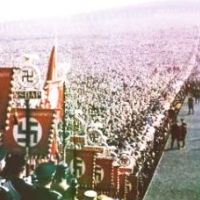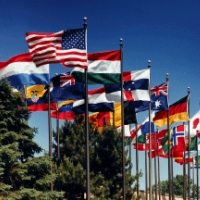- About Us
- Columns
- Letters
- Cartoons
- The Udder Limits
- Archives
- Ezy Reading Archive
- 2024 Cud Archives
- 2023 Cud Archives
- 2022 Cud Archives
- 2021 Cud Archives
- 2020 Cud Archives
- 2015-2019
- 2010-2014
- 2004-2009
 |
150 Issues Of The Cud- April 2008: Why I Am Not a Patriot |
As if on cue, I thought it felicitous to discuss why I’m not a patriot. I’ve already taken on the indefensible position of not  supporting the troops in an earlier Cud issue, so it’s clear that the next coherent step that should slam me away in some adaptation of Gitmo would be to describe why I don’t consider myself a nationalist, a patriot, or any other such thing associated merely with the locality I happened to be born in.
supporting the troops in an earlier Cud issue, so it’s clear that the next coherent step that should slam me away in some adaptation of Gitmo would be to describe why I don’t consider myself a nationalist, a patriot, or any other such thing associated merely with the locality I happened to be born in.
Of course, there are reasons that individuals should want to be patriots. Good reasons, too. But, alas, I can’t find any good reason for my own point of view to reflect that of a patriot. All the same, it’s essential to thrash out the good reasons for patriotism because it’s imperative to be just at all times. First, an elucidation: patriotism does not equate to a pride of one’s culture. Taking pride in one’s culture is a wholly dissimilar matter. I am, for our purposes, defining patriotism as affirmative and accommodating attitudes towards the fatherland or motherland. Patriotism is essentially a sort of geographical conceit or superiority.
So with that in mind and with geographical conceit as our definition of patriotism, let’s explore some of the good reasons for patriotism. One such reason would be the transference of geographical location from one of disorder to one of virtual wellbeing. An individual fleeing a country in which he or she found himself or herself being maltreated or desecrated would confidently find a persuasive argument for having patriotic ideals once moved to safer ground. That same individual would likely not be very patriotic, to use our definition, in terms of the homeland he or she was fleeing. To be patriotic to one’s sadistic fatherland would be out of the ordinary, to say the least.
This leads into the principal terrain of our conversation. The ethical implications of patriotism are, in my view, quite disquieting. They become more distressing,  logically, when one’s homeland is acting in an atrocious, aggressive, and evil way with foreign policy or ideology. As with our example of the individual fleeing the homeland, it would seem peculiar to be patriotic of a nation that has a history or a present directive of bullying, abuse, and despoliation. Having geographical conceit in terms of a nation that appears to supersede moral sense seems odd, in my opinion.
logically, when one’s homeland is acting in an atrocious, aggressive, and evil way with foreign policy or ideology. As with our example of the individual fleeing the homeland, it would seem peculiar to be patriotic of a nation that has a history or a present directive of bullying, abuse, and despoliation. Having geographical conceit in terms of a nation that appears to supersede moral sense seems odd, in my opinion.
The ethical implications of patriotism are comparable to the ethical and moral implications of blindly supporting the troops. Patriotism implies that the fatherland or motherland is a moral agent. The common patriotic expression “my country right or wrong” is a substantiation of this philosophy. The connotation here is that the fatherland or motherland is a moral standard in and of itself. When we frame this in the context of the United States of America, this moral standard in and of itself becomes clear with preposterously obtrusive nakedness.
To follow this implication further is to esteem the connivance that patriotism has with supporting the troops or, perhaps more truthfully, in point of fact becoming a member of the Armed Forces. Patriotism almost always calls its members to a paradigm of deed or conduct. This standard of action or behaviour manifests itself in diverse ways. Churches, mosques, and synagogues dedicated to worshipping icons of their respective faiths turn to bless “America.” Baseball games open with national anthems. Individuals support the troops by having flag-waving parades. And other individuals are coerced into joining the troops, killing non-members, and being patriotic. These are all examples of which we are acutely aware.
As patriotism of the fatherland or motherland manifests itself, we find ourselves in various compromising positions if we have not given intermission  to our own geographical conceit. If we follow our country and our geographical conceit blindly to the brink of war, we are complicit in the actions of our fatherland or motherland. When a nation acts reprehensively, callously, or appallingly, the supportive members of that state (its patriots) are also reprehensible, callous, and I daresay appalling.
to our own geographical conceit. If we follow our country and our geographical conceit blindly to the brink of war, we are complicit in the actions of our fatherland or motherland. When a nation acts reprehensively, callously, or appallingly, the supportive members of that state (its patriots) are also reprehensible, callous, and I daresay appalling.
According to the Correlates of War, a 1963 study on the history of war from the University of Michigan, high levels of patriotism tend to accompany marches to war. In pre-World War I Germany, levels of patriotism were high. In modern America, levels of patriotism are now equally as high. Patriotic intensity appears to be at its highest when the motherland or fatherland is considered to be under some form of threat. This rabid patriotic intensity often leads to miscalculated and underestimated responses and tactics, as the current United States War in Iraq demonstrates. History is ripe with these rushes to combat and, sadly, the complicity of the patriots is almost always a shadow during the march to war.
The World Values Survey sheds more light on the studies of the Correlates of War. The War Values Survey first took place in 1990-1992 and asked the question “Are you proud to be (insert nationality)?” In the first survey in 1990-1992, the United States of America registered the highest with South Africa coming in second and Canada coming in third. In subsequent studies, the United States has always ranked near or at the very top of the survey. More information about the World Values Survey can be found on their website at http://www.worldvaluessurvey.org. More information on the Correlates of War can be found online, too, at http://correlatesofwar.org.
I am not a patriot. I am not a patriot because I will not be morally or ethically complicit in the unacceptable actions of the fatherland or motherland.  I do not believe that I have moral duties to serve my country purely for the reason that it is where my parents and their parents and their parents lived. I do not believe in the discriminatory philanthropy of patriotism, nor do I subscribe to the notion that the lives of those living within my particular environmental dominion deserve more or less than those living elsewhere. I do not believe in this moral predilection. Paul Gomberg compared this ethical partiality to racism and I believe he is exact in this contention.
I do not believe that I have moral duties to serve my country purely for the reason that it is where my parents and their parents and their parents lived. I do not believe in the discriminatory philanthropy of patriotism, nor do I subscribe to the notion that the lives of those living within my particular environmental dominion deserve more or less than those living elsewhere. I do not believe in this moral predilection. Paul Gomberg compared this ethical partiality to racism and I believe he is exact in this contention.
I am not a patriot because I do not pledge to a value inclination for my unambiguous municipal community or geographical location. I do not have a geographical conceit. I do not think God blesses my country but not yours. Patriotism is too closely related to jingoism and chauvinism to have my support.
I believe that patriotism, like all other blind support systems, is a peril to society at large. Instead of attentiveness to a larger, worldwide scale, patriots are taught to wave a flag and wear one on their backpack when out of the country. Instead of learning more about other cultures and creating a mosaic within one’s own geographical states, patriots are taught to “love it or leave it.” Instead of embracing the world, patriots are trained to “buy American.” Patriotism imposes a tomblike fear on individuals who are trapped by their own lack of knowledge, making it one of the more treacherous “virtues” surviving in the world today.
Instead of patriotism, I propose individual values and moral choices.  I propose that no nation on earth shall, at any time in history past or present or future, be a moral last word or guiding light. I propose that morality and ethics come from the initiative of being humans, not Americans, Canadians, Australians, or Britons. I propose altruism for other human beings, not for the demands and requests of a federal geographical vanity. I propose cosmopolitanism and the conviction that we all are a part of one moral community, not individualized geographical areas of tactical expediency.
I propose that no nation on earth shall, at any time in history past or present or future, be a moral last word or guiding light. I propose that morality and ethics come from the initiative of being humans, not Americans, Canadians, Australians, or Britons. I propose altruism for other human beings, not for the demands and requests of a federal geographical vanity. I propose cosmopolitanism and the conviction that we all are a part of one moral community, not individualized geographical areas of tactical expediency.
I am not a patriot. I cannot be a patriot without abandoning my moral sense, my common sense, and my good sense. I won’t be burning flags because I esteem those that choose patriotism as a virtue and I respect those that truly have a reason for geographical conceit. I will, however, continue to be a citizen of the world and not merely a citizen of Canada.
